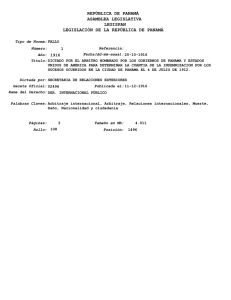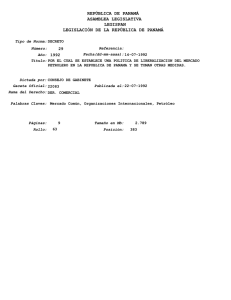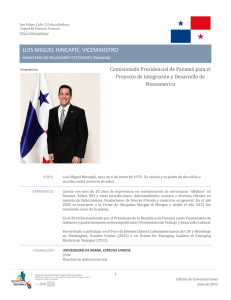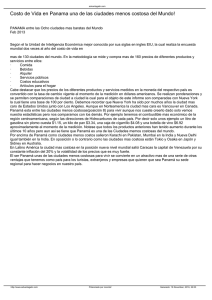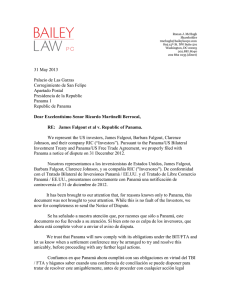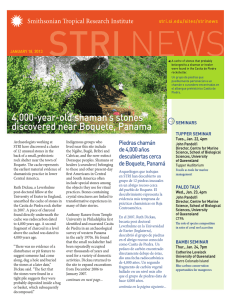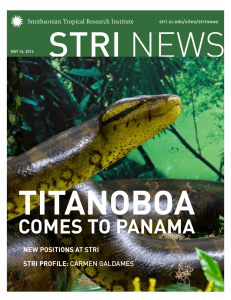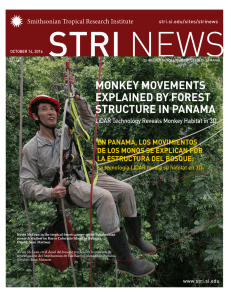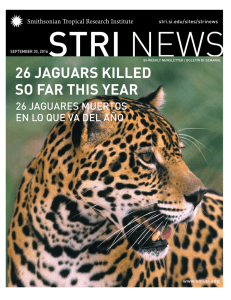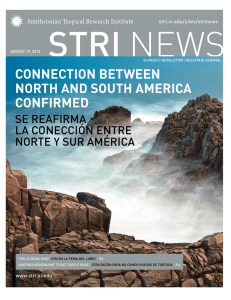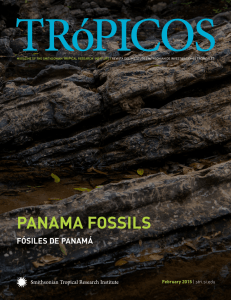A new field guide untangles identification of tropical vines
Anuncio
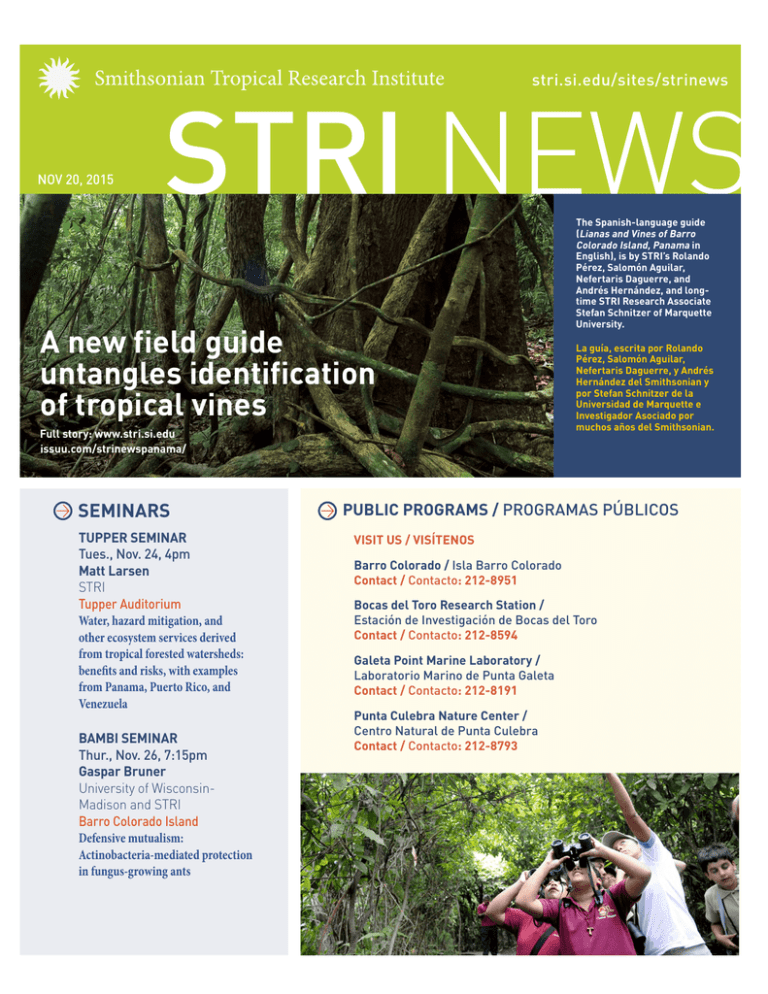
stri.si.edu/sites/strinews NOV 20, 2015 A new field guide untangles identification of tropical vines Full story: www.stri.si.edu issuu.com/strinewspanama/ SEMINARS TUPPER SEMINAR Tues., Nov. 24, 4pm Matt Larsen STRI Tupper Auditorium Water, hazard mitigation, and other ecosystem services derived from tropical forested watersheds: benefits and risks, with examples from Panama, Puerto Rico, and Venezuela BAMBI SEMINAR Thur., Nov. 26, 7:15pm Gaspar Bruner University of WisconsinMadison and STRI Barro Colorado Island Defensive mutualism: Actinobacteria-mediated protection in fungus-growing ants The Spanish-language guide (Lianas and Vines of Barro Colorado Island, Panama in English), is by STRI’s Rolando Pérez, Salomón Aguilar, Nefertaris Daguerre, and Andrés Hernández, and longtime STRI Research Associate Stefan Schnitzer of Marquette University. La guía, escrita por Rolando Pérez, Salomón Aguilar, Nefertaris Daguerre, y Andrés Hernández del Smithsonian y por Stefan Schnitzer de la Universidad de Marquette e Investigador Asociado por muchos años del Smithsonian. PUBLIC PROGRAMS / PROGRAMAS PÚBLICOS VISIT US / VISÍTENOS Barro Colorado / Isla Barro Colorado Contact / Contacto: 212-8951 Bocas del Toro Research Station / Estación de Investigación de Bocas del Toro Contact / Contacto: 212-8594 Galeta Point Marine Laboratory / Laboratorio Marino de Punta Galeta Contact / Contacto: 212-8191 Punta Culebra Nature Center / Centro Natural de Punta Culebra Contact / Contacto: 212-8793 LIONFISHER CAZADORES DE PEZ LEÓN STRI staff scientist Andrew Altieri joined a group of El científico del Smithsonian Andrew Altieri se unió a un grupo de buzos voluntarios coordinados por la Universidad Marítima Internacional de Panamá (UMIP) para buscar peces león invasores cerca de la entrada del Caribe del Canal de Panamá. En el evento participaron el Ministerio de Ambiente de Panamá (MiAmbiente) y los servicios de seguridad marítima, incluyendo la autoridad naval, la policía nacional y la Patrulla Fronteriza proporcionaron transporte en lanchas. Altieri cazó el pez más grande. volunteer divers coordinated by Panama’s Universidad Marítima Internacional (UMIP) to hunt for the invasive lionfish near Panama’s Caribbean entrance to the Panama Canal. Panama’s Ministry of the Environment (MiAmbiente) participated in the event and maritime security services including the naval authority, national police and border patrol provided boat transportation. Altieri speared the largest fish. NOV 20, 2015 VILLARREAL RBGE APPOINTMENT VILLARREAL NOMBRADO AL RBGE Tupper Fellow Juan Carlos Villarreal was recently El ganador de la beca Tupper del Smithsonian, Juan Carlos Villarreal, fue nombrado como investigador asociado en el Real Jardín Botánico de Edimburgo (RBGE) localizado en Escocia. Villarreal, de Panamá, se especializa en briofitas, plantas diminutas entre las cuales se encuentran los musgos, las hepáticas y los antocerotófitos. Ha estado colaborando con briólogos del RBGE durante varios años. En el Smithsonian, también estudia la relación simbiótica de las plantas con las cianobacterias (utilizadas por las briofitas para obtener nitrógeno) a nivel genómico. La investigación puede ayudar en la creación de herramientas genéticas que podría reducir la demanda de fertilizantes artificiales para los cultivos alimenticios. appointed as a research associate at the Royal Botanic Garden in Edinburgh (RBGE), Scotland. Villarreal, from Panama, specializes in bryophytes, tiny plants including mosses, liverworts and hornworts and he has been collaborating with RBGE bryologists for several years. At STRI, he also studies the plants’ symbiotic relationship with cyanobacteria (which bryophytes use to obtain nitrogen) at a genomic level. The research could help the creation of genetic tools that could reduce artificial fertilizer demands for food crops. NOV 20, 2015 CONGRATULATIONS SABRINA! FELICIDADES SABRINA! Sabrina Amador, becaria de post doctorado de la scientists Bill Wcislo and Bill Eberhard, received a prize Institución Smithsonian junto con los científicos Bill this week for best young investigator in her field: the Wcislo y Bill Eberhard, recibió un galardón por ser International Union for the Study of Social Insects-North la mejor investigadora joven en su campo: la Unión American Section 2015 George C. Eickwort Student Internacional para el Estudio de Insectos SocialesResearch Award. Sabrina will receive a plaque and a Sección Norteamericana, el Premio de Investigación $1000 honorarium. Estudiantil George C. Eickwort del 2015. Sabrina For her postdoctoral project “Democracy dilemma: recibirá una placa y un honorario de $1,000. is it advantageous to have several individuals deciding Para su proyecto de post doctorado “El dilema de about a solitary task?” Sabrina will ask whether conflicts la democracia: ¿Es ventajoso tener varios individuos that arise when more than one individual in an acacia que deciden acerca de una tarea solitaria?” Sabrina ant colony vies to do a single task. Does conflict increase investigará si los conflictos que surgen cuando más the accuracy or speed of the decision? Will the most de un individuo en una colonia de hormigas de la proficient worker take over the task? Or will conflict lead acacia compite para hacer una sola tarea. ¿Aumenta el to a delay resulting in a decrease in the overall efficiency conflicto la exactitud o la velocidad de la decisión? ¿El of the colony? trabajador más competente se hará cargo de la tarea? O ¿el conflicto llevará a un retraso que resulte en una disminución en la eficiencia global de la colonia? Sabrina Amador, SI Postdoctoral Fellow with staff NOV 20, 2015 A PLAN TO ENHANCE SCIENCE IN PANAMA UN PLAN PARA AUMENTAR LA CIENCIA EN PANAMÁ Panama’s National Secretariat of Science, Technology La Secretaría Nacional de Ciencia, Tecnología e Innovación and Innovation (SENACYT) revealed the content and scope of a new National Policy on Science, Technology and Innovation and the National Plan for 2015-2019. These tools seek to position Panama on the path to becoming a knowledge society. The strategy extends until 2040, in response to the great national challenges that must be addressed through science, research, technological development and innovation, in particular, its contribution to sustainable development, social inclusion, competitiveness and entrepreneurship. Among the speakers at the event were Jorge Motta, National Secretary of SENACYT, Felipe Rodriguez of Panamanian Association of Business Executives APEDE, Oris Sanjur, Associate Director for Science Administration at STRI and respresenting the Panamanian Association for the Advancement of Science, José Miguel Benavente, head of the Division of Competitiveness and Innovation of the Inter-American Development Bank (IDB) and Fernando Hiraldo, deputy resident representative of the United Nations Program for Development (UNDP). (SENACYT) dio a conocer al país y a la comunidad científica internacional el contenido y alcance de la Política Nacional de Ciencia, Tecnología e Innovación y el Plan Nacional 2015-2019, herramientas que buscan posicionar a Panamá en la ruta para convertirse en una sociedad del conocimiento. El documento cuenta con una Política Nacional de Ciencia, Tecnología e Innovación con alcance hasta el año 2040, que busca responder a los grandes desafíos nacionales que deben ser atendidos a través de la ciencia, la investigación, el desarrollo tecnológico y la innovación, en particular la contribución al desarrollo sostenible, la inclusión social, la competitividad y el emprendimiento. Entre los oradores del evento estaban Jorge Motta, secretario nacional de la SENACYT, Felipe Rodríguez de las Asociación Panameña de Ejecutivos de Empresa APEDE, Oris Sanjur, directora asociada para la administración de la ciencia en el Smithsonian y de la Asociación Panameña para el Avance de la Ciencia, José Miguel Benavente, Jefe de la División de Competitividad e Innovación del Banco Interamericano de Desarrollo (BID) y Fernando Hiraldo, representante residente adjunto del Programa de Naciones Unidas para el Desarrollo (PNUD). NOV 20, 2015 NUEVO LIBRO SOBRE PLANTAS EXÓTICAS EN PANAMÁ NEW BOOK: EXOTIC PLANTS IN PANAMA The book “Algunas plantas exóticas introducidas en Panamá: orígenes, usos y ecología” (“Some exotic plants introduced in Panama: origins, uses and ecology,”) was presented by botanists Omar Lopez Alfano, associate researcher at the Institute of Scientific Investigations and High Technology Services (INDICASAT-AIP) and research asociate at STRI and Rodolfo Flores, STRI research assistant. The book features 39 exotic species from the research project “The exotic flora of Panama: distribution, abundance and ecological impacts of introduced species”, led by Lopez Alfano between 2007 and 2008, under the auspices of INDICASAT-AIP. The research showed that the country has about 700 species of plants introduced from other regions as of 2008. On the other hand, it is estimated that Panama has some 12,000 species of native plants, said Lopez Alfano. “Exotic” plants are species native to other biogeographic areas, explains Lopez Alfano. Most of the introduced plants in Panama come from Asia, but there are also a significant number of plants from South and North America. The book gives a brief description of each species, where it originated and how it is usually grown as well as being very colorful and having beautiful pictures. El libro “Algunas plantas exóticas introducidas en Panamá: orígenes, usos y ecología”, fue presentado por los biólogos especialistas en botánica Omar López Alfano, investigador asociado al Instituto de Investigaciones Científicas y Servicios de Alta Tecnología (INDICASAT-AIP) y del Smithsonian y Rodolfo Flores, asistente de investigación en el Smithsonian. El libro muestra 39 especies exóticas que recopila parte del proyecto de investigación “La flora exótica de Panamá: distribución, abundancia y consecuencias ecológicas de especies introducidas”, que lideró López Alfano entre el 2007 y 2008, bajo el auspicio de INDICASAT-AIP. Dicha investigación arrojó en el 2008 que el país cuenta con cerca de 700 especies de plantas introducidas de otras latitudes, por otro lado, se estima que Panamá cuenta con unas 12 mil especies de plantas nativas, comentó López Alfano. Las plantas catalogadas como “exóticas” son aquellas especies que son originarias de otras áreas biogeográficas, aclara López Alfano. La mayoría de las plantas introducidas vienen de Asia, pero hay un número significativo de plantas de Suramérica y Norteamérica. El libro hace una breve descripción de la especie, de dónde es originaria, cómo se cultiva generalmente, es muy colorido y cuenta con bellas imágenes. NOV 20, 2015 BIODIVERSITY WORKSHOP TALLER DE BIODIVERSIDAD Recently Steve Paton, director of physical monitoring, Recientemente Steve Paton director de monitoreo físico y Ruth Reyna administradora de colecciones en el laboratorio marino en Naos, participaron en representación del Smithsonian en la primera mesa de trabajo “La Biodiversidad Panameña: retos y desafíos de su informatización” que se llevó a cabo en la Secretaria Nacional de Ciencia Tecnología e Innovación (SENACYT), con la participación de MiAmbiente, UP, STRI, CBMAP, INDICASAT, ICGES. El objetivo de este ejercicio es proponer una serie de acciones, que junto con los actores principales de biodiversidad, nos acerquen a un mejor entendimiento e informatización de la diversidad biológica de Panamá. and Ruth Reyna, collections manager at the marine laboratory in Naos, represented STRI at the first workshop “Biodiversity in Panama: Challenges of computerization” held in the National Secretariat of Science, Technology and Innovation (SENACYT), with the participation of MiAmbiente, UP, STRI, CBMAP, INDICASAT, ICGES. The goal of this exercise was to propose a series of actions, for the major players in biodiversity to improve understanding and cataloging of the biodiversity of Panama. NOV 20, 2015 PUBLICATIONS Grajales, Alejandro and Rodriguez, Estefania. 2016. Elucidating the evolutionary relationships of the Aiptasiidae, a widespread cnidarian–dinoflagellate model system (Cnidaria: Anthozoa: Actiniaria: Metridioidea). Molecular phylogenetics and evolution, 94: 252263.doi:10.1016/j.ympev.2015.09.004 Antoine, Pierre-Olivier, Abello, M. A., Adnet, Sylvain, Altamirano Sierra, Ali J., Baby, Patrice, Billet, Guillaume, Boivin, Myriam, Calderon, Ysabel, Candela, Adriana, Chabain, Jules, Corfu, Fernando, Croft, Darin A., Ganerod, Morgan, Jaramillo, Carlos A., Klaus, Sebastian, Marivaux, Laurent, Navarrete, Rosa E., Orliac, Maeva J., Parra, Francisco, Perez, Maria Encarnacion, Pujos, Francois, Rage, Jean-Claude, Ravel, Anthony, Robinet, Celine, Roddaz, Martin, et al. 2015. A 60-million-year Cenozoic history of western Amazonian ecosystems in Contamana, eastern Peru. Gondwana Research, doi:10.1016/j.gr.2015.11.001 Arias, Carlos A., Van Belleghem, Steven and McMillan, W. Owen. 2015. Genomics at the evolving species boundary. Current Opinion in Insect Science,doi:10.1016/j.cois.2015.10.004 Beaudrot, Lydia, Kroetz, Kailin, Alvarez-Loayza, Patricia, Amaral, Ieda, Brener, Thomas, Fletcher, Christine D., Jansen, Patrick A., Kenfack, David, Moreira Lima, Marcela Guimaraes, Marshall, Andrew R., Martin, Emanuel H., Ndoundou-Hockemba, Mireille, Razafimahaimodison, Jean Claude, Romero-Saltos, Hugo, Rovero, Francisco, Roy, Cisquet Hector, Sheil, Douglas, Silva, Carlos E. F., Spironello, Wilson Roberto, Valencia, Renato, Zvoleff, Alex, Ahumada, Jorge and Andelman, Sandy. 2015. Limited carbon and biodiversity co-benefits for tropical forest mammals and birds. Ecological Applications,doi:10.1890/15-0935.1 Carter, Gerald G. and Wilkinson, Gerald S. 2015. Social benefits of non-kin food sharing by female vampire bats. Proceedings of the Royal Society B: Biological Sciences, 282(1819): 20152524 doi:10.1098/rspb.2015.2524 Dijkstra, Peter D., Pierotti, Michele E. R., Seehausen, Ole and Metcalfe, Neil B. 2015. Metabolism, oxidative stress and territorial behaviour in a female colour polymorphic cichlid fish. Behavioral Ecology and Sociobiology, doi:10.1007/ s00265-015-2028-4 Dugas, Matthew B., Wamelink, Caitlin N., Killius, Allison M. and RichardsZawacki, Corinne.2015. Parental care is beneficial for offspring, costly for mothers, and limited by family size in an egg-feeding frog. Behavioral Ecology, doi:10.1093/beheco/arv173 Easson, Cole G., Matterson, Kenan O., Freeman, Christopher J., Archer, Stephanie K. and Thacker, Robert W. 2015. Variation in species diversity and functional traits of sponge communities near human populations in Bocas del Toro, Panama. PeerJ, 3: e1385doi:10.7717/peerj.1385 Galeano, Sandra P. and Harms, Kyle Edward. 2015. Coloration in the polymorphic frog Oophaga pumilio associates with level of aggressiveness in intraspecific and interspecific behavioral interactions. Behavioral Ecology and Sociobiology, doi:10.1007/ s00265-015-2027-5 Grajales, Alejandro, Rodriguez, Estefania and Thornhill, Daniel J. 2015. Patterns of Symbiodinium spp. associations within the family Aiptasiidae, a monophyletic lineage of symbiotic of sea anemones (Cnidaria, Actiniaria). Coral Reefs, : 1-11.doi:10.1007/s00338015-1352-5 DEPARTURES ARRIVALS Matthew Hayes and Amber Jesse University of Queensland Growth and interspecific competition in mangroves: The potential effects of climate change and nutrient enrichment on community composition of mangroves Gamboa Ian Baillie Cranfield University Soil Nutrient Dynamics Tupper GET IN TOUCH! WE’D LOVE TO KNOW WHAT YOU THINK: Patrick Jansen To Washington DC To participate in meetings on the Tropical Ecology Assessment and Monitoring network, the eMammal project, and CTFS-ForestGEO Mario Bailon and Federico Davis To Colón, Panamá To measure transect secondary forest Jacob Slusser To Pedasí, Los Santos, Panamá To facilitate ELTI’s training course: Ecological Restoration in Cattle Ranching Landscapes and provide follow up with Leadership Program Alumni Saskia Santamaria To Los Santos, Panamá To carry out the ELTI course Ecological Restoration Strategies for Cattle Ranching Landscapes of the Azuero ¡CONTÁCTANOS! NOS ENCANTARÍA SABER SU OPINION: NOV 20, 2015 NOV 20, 2015 NOV 20, 2015 NOV 20, 2015 NOV 20, 2015
